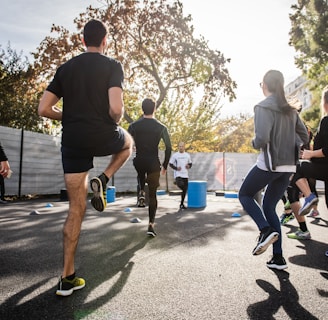Managing Anxiety with Physical Activity
Exercise has long been recognized not only for its physical health benefits but also for its positive impact on mental well-being, particularly in managing anxiety.


Engaging in regular physical activity can significantly alleviate symptoms of anxiety and contribute to overall mental wellness. Here are some ways in which exercise helps with anxiety:
Release of Endorphins: Exercise triggers the release of endorphins, often referred to as "feel-good" hormones. These chemicals interact with the brain receptors, reducing the perception of pain and triggering positive feelings, which can counteract anxiety symptoms.
Reduction of Stress Hormones: Physical activity helps regulate the production of stress hormones like cortisol and adrenaline. Regular exercise lowers the overall levels of these hormones in the body, leading to a calmer state of mind and reduced anxiety.
Distraction and Focus: Engaging in physical activity provides a healthy distraction from anxious thoughts and worries. Focusing on the movement of your body, whether through aerobic exercise, strength training, or yoga, can shift your attention away from negative thinking patterns.
Improvement in Sleep Quality: Anxiety often disrupts sleep patterns, leading to insomnia or restless nights. Regular exercise promotes better sleep quality by regulating the sleep-wake cycle and promoting relaxation, which is crucial for managing anxiety symptoms.
Boost in Self-esteem: Regular physical activity can boost self-esteem and confidence, which are often negatively impacted by anxiety. Achieving fitness goals, improving physical strength, and feeling more energized can contribute to a positive self-image and reduce anxiety-related self-doubt.
Social Interaction: Participating in group exercises or sports activities can provide social support and a sense of belonging, both of which are beneficial for managing anxiety. Social interaction during exercise can reduce feelings of isolation and improve mood.
Mind-Body Connection: Practices such as yoga, tai chi, or mindful walking emphasize the mind-body connection, promoting relaxation, mindfulness, and stress reduction. These activities can be particularly effective in managing anxiety and improving overall well-being.
Long-term Benefits: Consistent exercise over time can lead to long-term benefits in managing anxiety. Building physical fitness, resilience, and coping mechanisms through regular activity can help individuals better manage stressors and anxiety triggers.
Incorporating exercise into your routine doesn't have to be daunting. Start with activities you enjoy, whether it's walking, dancing, swimming, or practicing yoga. Aim for at least 30 minutes of moderate-intensity exercise most days of the week for optimal mental health benefits. It's essential to consult with a healthcare professional or mental health specialist for personalized recommendations and support in managing anxiety effectively.
